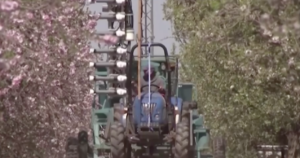
Israeli expert says, “As the bee population is declining, global agriculture needs a solution which doesn’t rely on bees anymore but which will either supplement or eventually replace the bees.”
By Reuters, Israel Hayom Staff
A mechanical hum replaced the buzz of the bees in one Israeli almond orchard this season as farmers, concerned over the global decline of bee populations, tried a new method to pollinate their crops.
Through the blooming almond trees near the ancient site of Tel Arad in a desert plain in southern Israel, a tractor pulled a mast equipped with about a dozen small cannons that precisely shot pollen at the trees, allowing them to fertilize.
The job is usually done by natural pollinators, particularly bees, but there has been a drastic fall in the number of bees around the world, largely due to intensive agriculture, pesticides and climate change.
Most crops rely on pollination, so the trend has worried groups like the UN Food and Agriculture Organization as it looks to fight hunger among a rising human population.
“We see a crisis in 15 years where we don’t have enough insects in the world to actually do pollination and most of our vitamins and fruits are gone,” said Eylam Ran, CEO of Edete Precision Technologies for Agriculture.
His company says its artificial pollinator can augment, and eventually replace, bees. It mirrors the work of the honey bee, beginning with a mechanical harvest of pollen from flowers and ending with a targeted distribution using LIDAR sensors, the same technology used in some self-driving cars.
While bee researcher, Dr. Victoria Soroker is doubtful that honey bees can ever be replaced, she welcomes any agricultural technology that can ease the burden on the insects that are often harmed by massive hives gathering to pollinate huge monoculture fields for pollination, such as California’s over a million-acre almond orchards.
Edete has been working on a small-scale trial in several orchards in Israel and Australia and has agreements to do the same in the United States and Spain. The company hopes to scale up and be market-ready for 2023.

Ran added that California’s almond industry nowadays is paying over $400 million for beehives annually, yet doesn’t have enough of them for efficient pollination. Edete is planning to provide its mechanic pollination service at a cost similar to that of beehives.
Joseph Frey, CTO of Edete Precision Technologies For Agriculture, said, “As the bee population is declining, global agriculture needs a solution which doesn’t rely on bees anymore but which will either supplement or eventually replace the bees.”
View original Israel Hayom publication at:
https://www.israelhayom.com/2020/04/24/mechanical-pollinator-helps-israeli-farmers-cope-with-declining-bee-population/
To learn more about Edete Precision Technologies For Agriculture, visit their website.
ISRAEL
‘as a light unto the nations’






 Israeli New Shekel Exchange Rate
Israeli New Shekel Exchange Rate